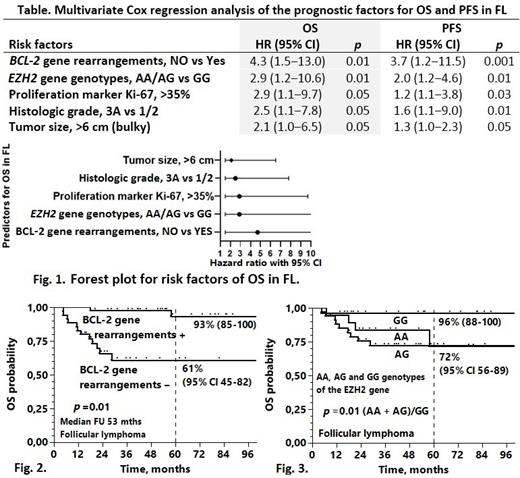Abstract
Background: Follicular lymphoma (FL) is characterized by clinical and morphological heterogeneity. It is based on the pathogenetic mechanisms of the development of tumor cells. The identification and assessment of risk factors associated with the course of the disease and treatment outcome in FL is an important task, as it allows to evaluate and predict the effectiveness of therapy.
Objective: Identify and estimate risk factors for overall survival (OS) and progression free survival (PFS) in FL.
Patients and Methods: The prospective exploratory study conducted at National Research Center for Hematology (Moscow) from 01/2017 to 04/2021 included patients (pts)(in total, 80) with FL. Morpho-immunohistochemical, cytogenetic and molecular studies were performed on biopsies of lymph nodes taken before the start of therapy. The mutational status of exon 16 and intron polymorphism rs_2072407 of the EZH2 gene were investigated by Sanger sequencing. 18q21/BCL-2 rearrangements were determined by conventional cytogenetic analysis and/or FISH study. The results obtained in a blind study were compared with the effect of the therapy.
Results: Of the 80 pts 34 were male: Me (median) age 50 years (range 30-72) and 46 were female: Me 56 (range 21-81). The median follow-up (FU) time was 53 months.
As a result of the study in the multivariate Cox regression model (likelihood-ratio test, p=0.01) of significant factors, selected in the previously univariate analysis, the following statistically significant (Wald test) risk factors for OS and PFS (the events: progression, relapse, or death) were obtained:
• BCL-2 gene rearrangements (no vs yes)
• EZH2 gene genotypes (AA/AG vs GG)
• proliferation index Ki-67 (>35%)
• morphological grade (3А vs 1/2)
• tumor size (>6 cm /bulky/) (Tab. 1, Fig. 1)
The BCL-2 rearrangements were found in 45 from 80 pts (56%; 95 % CI 45-66). The probability of BCL-2 rearrangements is estimated to be about 0.5 (50%). According to the results of Cox-regression analysis (by OS) in the absence of BCL-2 rearrangements, the risk of death in FL was generally significantly (p = 0.01) higher than in the group with its presence: HR = 4.3 (95 % CI 1.5-13.0) (Fig. 2)
Mutations in the 16th exon of the EZH2 gene (mutEZH2) were found in 10/80 (13%) pts. Analysis of EZH2 gene mutations with BCL-2 rearrangements revealed that in the mutEZH2 group with the presence of BCL-2 rearrangements, the number of deaths associated with progression is significantly less than in the control initial groups (mutEZH2 with BCL-2 rearrangements - 0/6, mutEZH2 without BCL-2 rearrangements - 2/4, wEZH2 with BCL-2 rearrangements - 3/39 (8%), wEZH2 without BCL-2 rearrangements - 11/31 (35%)) .
The prognostic significance of EZH2 genotypes in lymphomas was studied for the first time in this study. The frequencies of rs_2072407 genotypes were: AA - 24% (19), AG - 42% (34), and GG - 34% (27). AA and AG genotypes of the EZH2 gene in pts with FL were associated with an increased risk of death (compared to the GG genotype) : HR = 2.9 (95% CI: 1.2-10.6), p = 0.01 (Fig. 3). The GG variant in most cases was associated with wEZH2 (26/27 (96%)) with BCL-2 rearrangements (16/26 (62%)) and a favorable prognosis (26/27 (96%)) (p = 0.01).
Index of proliferative activity Ki-67> 35% (n = 40) and Ki-67 ≤ 35% (n = 40) were equally common in the study group. With a Ki-67> 35%, the probability of death is 2.9 (95% CI 1.1-9.7) times higher.
The frequency distribution of morphological grade was as follows: grade 3A - 53% (n = 43) and grade 1-2 - 47% (n = 37). At grade 3A, the probability of death is 2.5 (95% CI 1.1-7.8) times higher.
The number of pts with tumor size >6 cm (bulky) and ≤ 6 cm in the sample is approximately the same (41 and 39, respectively), the presence of bulky increased the mortality risk by 2.1 (95% CI 1.0-6.5) times.
A short time from the manifestation of the disease to appeal to medical care is a predictor of poor prognosis, but this result we received earlier on a large sample of pts was not significant on a smaller sample.
Conclusions: As a result of the multivariable Cox regression analysis, we identified and confirmed the previously obtained factors (bulky, grade 3A, Ki-67 > 35%, short medical history), and discovered new biogenetic factors (BCL-2 rearrangements and the GG rs2072407 genotype of the EZH2 gene). The model based on these independent risk factors improves the accuracy of predicting adverse events and allows to use more personalized treatment options for patients with FL.
No relevant conflicts of interest to declare.


